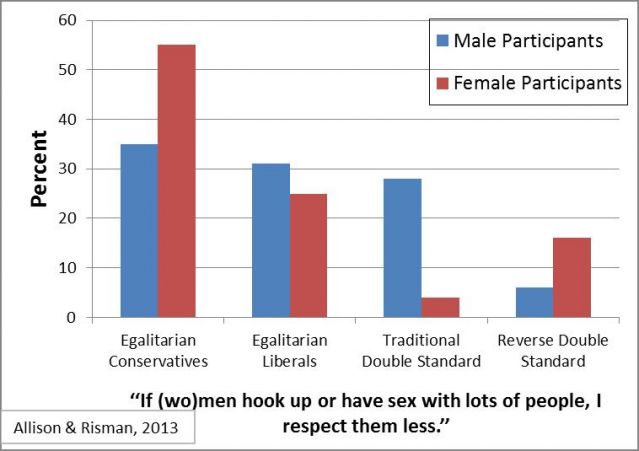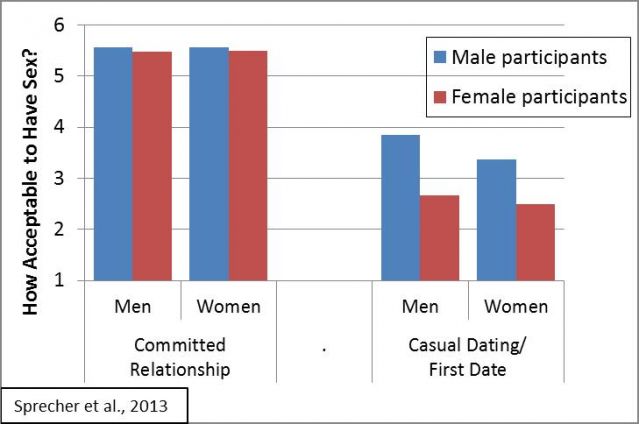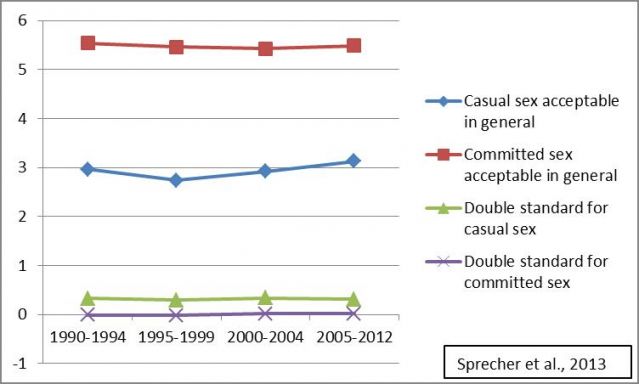Sex
Is Our Sexual Double Standard Going Away?
The sexual double standard Is not necessarily going away, but it may be evolving
Posted March 3, 2014

Everyone knows there is a double sexual standard. Ask any survey participant—male or female—and they'll tell you that women are judged more harshly than men for engaging in the same behaviors, especially when those behaviors are casual sex or sex with lots of partners. Men are studs for doing it, but women are sluts.
Participants will tell you that other people judge men and women differently, but finding the double standard in participants themselves has proven more challenging. It's been so challenging, in fact, that some researchers have argued that while the double standard may have existed in the past, it has all but disappeared among the current generation of young people.
Is there still a double standard? And if so, who’s more guilty of perpetuating it, men or women? Two recent studies shed some light on these questions.
In a 2013 paper published in Social Science Research, Rachel Allison and Barbara Risman of the University of Illinois at Chicago analyzed data from over 24,000 U.S. undergraduates at 22 colleges across the country. The sample wasn’t representative, but it was the largest and most diverse providing information about double standards.
Students were asked how much they agreed/disagreed with the following statement (separately for male and female targets): “If (men/women) hook up or have sex with lots of people, I respect them less.” Here is what they got:

Most people (66% of men and 70% of women) did NOT endorse a double standard. Instead, a full 55% of women and 35% of men (called "egalitarian conservatives" in the study) said they would lose respect for both men and women who hooked up a lot. On the other end of the spectrum were "egalitarian liberals," the 25% of women and 31% men who said they would not lose respect for a promiscuous person of either gender.
A double standard, however, was espoused by about a third of participants of both sexes, although they did not all hold the "traditional double standard." Some 28% of men and 4% of women said they would only lose respect only for women, but not men, who hook up a lot. But 16% of women and 6% of men reported the opposite, or the "reverse double standard": They would lose respect only for promiscuous men, but not similarly active women.
A second 2013 study, published in the Archives of Sexual Behavior, looked for the double standard using a different methodology. For the past 23 years, Susan Sprecher of Illinois State University and her colleagues have been giving the same survey to students enrolled in a human sexuality course at a Midwestern university, asking them how acceptable they find sexual intercourse for men and women across five different relationship contexts: first date; casual dating (together less than one month); serious dating (together for about a year); long-term/pre-engaged; and engaged. The graph below shows the results for all 7,777 participants surveyed over the two decades.

As you can see, premarital sex was not an issue: Everyone agreed that sex in a committed relationship was perfectly acceptable for both men and women, with average scores surpassing 5.5 on a scale of 1 to 6. Sex in a casual context was a different matter. Regardless of which gender was having it, both male and female participants perceived casual sex as far less acceptable: In most cases, the average acceptance level didn’t even reach the mid-point of the scale. (Unsurprisingly, women were less accepting of casual sex than men overall.)
Not only were people, and women in particular, far less accepting of casual than committed sex, the graphs clearly demonstrate a double standard for casual sex that doesn't exist for committed sex: Both men and women considered casual sex more acceptable for men than for women. This double standard was somewhat stronger in male than female participants, but present in both genders.
So, has the double standard really lessened over the past 23 years? Not at all.
Although casual sex in general became slightly more acceptable over time (see blue line below), there was no change in the endorsement of the double standard (the green line, calculated as participants' rating of casual sex acceptability for men minus their rating for women). No change whatsoever. Students considered casual sex less acceptable for women than for men in 2012 just as much as they did in 1990.

What can we conclude from these two studies?
- Unlike premarital sex in committed relationships, which was once a hot-button topic but now viewed as OK by most Americans, the battle over the acceptability of casual sex has not (yet) been won by either side.
- A multitude of attitudes exist simultaneously among young people: Some consider casual sex wrong for everyone; others consider it OK for everyone; and others still consider it wrong for some but not for others.
- Women continue to be more conservative than men in their attitudes toward casual sex in general.
- There is still a double standard in the population as a whole, but only a minority of young men and women endorses it.
- Among those who endorse a traditional double standard, most are men.
The bad news in these findings is that the double standard still exists on average. The good news is that most young people do not subscribe to it.
The U.S. is an incredibly large and diverse country. Whether you're a casual sex supporter, or a no-sex-until-marriage kind of guy or gal, not everyone will agree with you. There is something and someplace for everyone. The key is to find your people and your place—where who you are will be accepted and respected by those you care about.
References:
Allison, R., & Risman, B. J. (2013). A double standard for “hooking up”: How far have we come toward gender equality? Social Science Research, 42, 1191-1206. doi:10.1016/j.ssresearch.2013.04.006
Marks, M.J., Fraley, R.C., 2005. The sexual double standard: Fact or fiction? Sex Roles, 52, 175–186. doi:10.1007/s11199-005-1293-5
Sprecher, S., Treger, S., & Sakaluk, J. K. (2013). Premarital sexual standards and sociosexuality: Gender, ethnicity, and cohort differences. Archives of Sexual Behavior, 42, 1395-1405. doi:10.1007/s10508-013-0145-6
Have a casual sex story to share with the world? That's what The Casual Sex Project is for.
Follow me on Twitter @DrZhana for daily updates on the latest in sex research, check out my website for more information about me, or sign up for my monthly newsletter to stay up up to date with all my sex research- and sex education- related activities.




